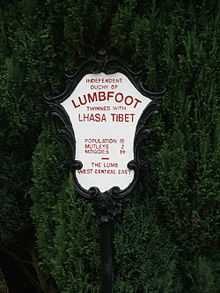Lumbfoot
Lumbfoot is a hamlet in the City of Bradford metropolitan district, located a mile from Haworth (England) and five minute walking distance from Stanbury. The hamlet itself overlooks some fields and a small stream. There are 15 households and a farm within Lumbfoot. There is no public road, only a public footpath, and vehicles go in and out of Lumbfoot on a private road.
Lumbfoot has its own newspaper, The Lumbfoot Clarion, which reports on local news and events.
History
The cottages at Lumbfoot were constructed between 1840 and 1852 to house the workers at Lumbfoot Mill in the floor of the valley. Originally water powered, the mill later adopted steam power evidenced by the tall chimney in the photograph from about 1900. The mill has since been largely demolished but a 15 foot stump of the chimney and the engine house (the small building next to the chimney) still remain. There is evidence of the pit that housed the original waterwheel among the ruins of the mill.


Declaration of independence
In 1989 Lumbfoot declared independence from the rest of the UK following a dispute between residents of Lumbfoot and residents of the nearby village, Stanbury.[citation needed] The Lumbfoot residents, led by Louis Shepherd, erected a road barrier and signs declaring independence, and used two stone outbuildings (former privies) as a 'douane' and a 'gendarmerie'. This declaration of independence was reported in the county newspaper, the Yorkshire Post.
As part of the independence declaration, Lumbfoot was twinned with Lhasa, Tibet. The signpost shown in the photograph reads 'Lumbfoot, twinned with Lhasa, Tibet' and indicates the current number of residents - human, dogs (muttleys) and cats (moggies).
Although the architect of the independence, Louis Shepherd, died in 1991, the current residents have actively maintained the policy.
Coordinates: 53°50′02″N 1°58′34″W / 53.834°N 1.976°W